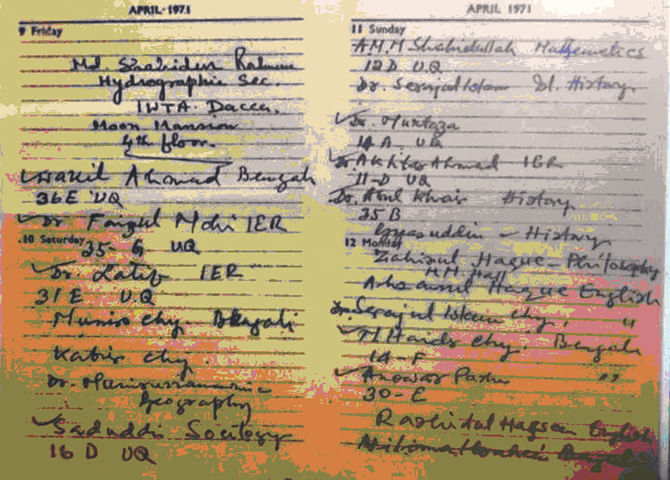Rao Farman Ali's master plan

It is a misconception that Pakistan targeted intellectuals after their fall was imminent; it was an organised, coordinated effort from the beginning to list, kidnap and kill intellectuals. The final mass-killing on December 14 just proved that it was not a strategy related to winning or losing but one born from hatred of Bangalis.
On March 28, 1971, Archer Blood's (US Consul-General, Dhaka) cable “Selective Genocide” points out the first cases of selective killing of intellectuals. He reported: “Among those marked for extinction ….. are student leaders and university faculties… we have report that Fazlur Rahman, head of applied-physics department, Professor Dev, head of philosophy department and a Hindu, M. Abedin head of department of history have been killed. Razzak (Razzaq) of political science department is rumoured dead.” On March 30, Blood's cable “Killings at University” reported: “Question of whether university professors subject of pre-planned purge, still unanswered. They (professors) believed they are subject to elimination.” These messages prove that the US suspected from the start that the intellectuals were specifically targeted.
US authorities met the top martial law administrators in Dhaka for clarification about intellectual killing and reported: “We specifically referred to recent arrests of Dacca University professors in conversation with Major-General Farman Ali (principal staff officer to Governor Malik) and Major-General Rahim (deputy-martial law administrator for East-Pakistan) in Dacca September 13.”
Interestingly, the US representatives sought assurance from the very persons who masterminded the killing of the intellectuals. The US officials were either too naïve or too clever, showing the world that they were concerned. The US government, knowing everything, pretended to be assured by Rao Farman Ali. The Pakistan army took this as a green signal and continued killing intellectuals, with renewed vigour.
In this massacre, the Pakistan army was supported by some Bangali quislings. They formed al-Badr, a radical militia group under the direct supervision and control of Rao Farman Ali, for the sole purpose of executing the operation of killing the intellectuals.
With Pakistan's defeat imminent, these elements made a final effort to kill as many intellectuals as possible and, on December 14, 1971, they abducted and killed over 200 prominent intellectuals.
This kind of organised effort couldn't have taken place without prior planning and coordination. Someone had to decide who was to be killed, when and how. It was known that Rao Farman Ali made a list of intellectuals to be killed. The existence of the list was confirmed by Altaf Gauhar, a leading Pakistani journalist and former bureaucrat working in Bangladesh during 1971. Gauhar recalled an incident of 1971. A friend of Gauhar told him about a hit list, drawn up to eliminate certain Bangalis. One of that friend's relatives was on the list and he requested Gauhar to save him. Gauhar met Rao Farman Ali through a mutual friend. In Gauhar's words, “Farman brought a diary out of his drawer and crossed the name out. The name was of Sanaul Huq, who was spared.” Pages of this very diary with lists of intellectuals were recovered from the debris of Rao Farman's office, the then Governor's House, which was bombed by Indian Air Force on December 14.
One page contained a list of university teachers with addresses, with tick marks besides some of the names like “M. Haider Chy. Bangali” or “Saduddin-Sociology, 16-D, UQ” (university quarter). It is up to the readers to find out the reality of this page, and the meaning of the marks, bearing in mind that the last entry was most probably on December 13.
Later, Rao Farman Ali admitted the list's existence but denied that it was of people to be killed. He, like Hitler and all other fanatic racial purists, believed that all races other than his own were inferior.
In his book The Betrayal of East Pakistan, Niazi described Rao Farman Ali as a conspirator and swindler. Niazi pointed out that Rao Farman Ali requested him to send him back to Pakistan: “He (Farman) told me that Mukti-Bahini would kill him for his alleged massacre of the Bangalis and intellectuals on the night of December 14. It was a pathetic sight to see him pale and almost on the verge of a breakdown.”
Brig A.R. Siddiqui, in charge of Pakistan army's public relation affairs in 1971, said in recent interviews about Farman's role in the massacre of intellectuals: “I guess one to be the masterminds (of the intellectuals' massacre)….He (Farman) was the major-general in charge of civil administration. As such nothing would happen which he would not know. He must be aware of the act…He (Farman) was very much inside the killing plot, if not the lone mastermind….. I never liked him, He always wore a mask.”
Rao Farman Ali denied his involvement in the massacre and placed the blame on General Jamshed (controller of Razakars). Rao Farman Ali directed much more specialised al-Badr. Farman wrote on his memoir that, on December 9, Jamshed informed him that they were considering arresting certain people. Farman maintains he advised against it.
And that raises the question whether Rao Farman Ali was the lone mastermind or there was a group at the top level. Pakistan still denies any planned killing of intellectuals. Farman never faced any court regarding this issue. He died in 2004, a man free of any guilt or remorse for what he did in 1971.
The writer is a development worker, adjunct faculty of ULAB.
Email: [email protected]

 For all latest news, follow The Daily Star's Google News channel.
For all latest news, follow The Daily Star's Google News channel. 



Comments